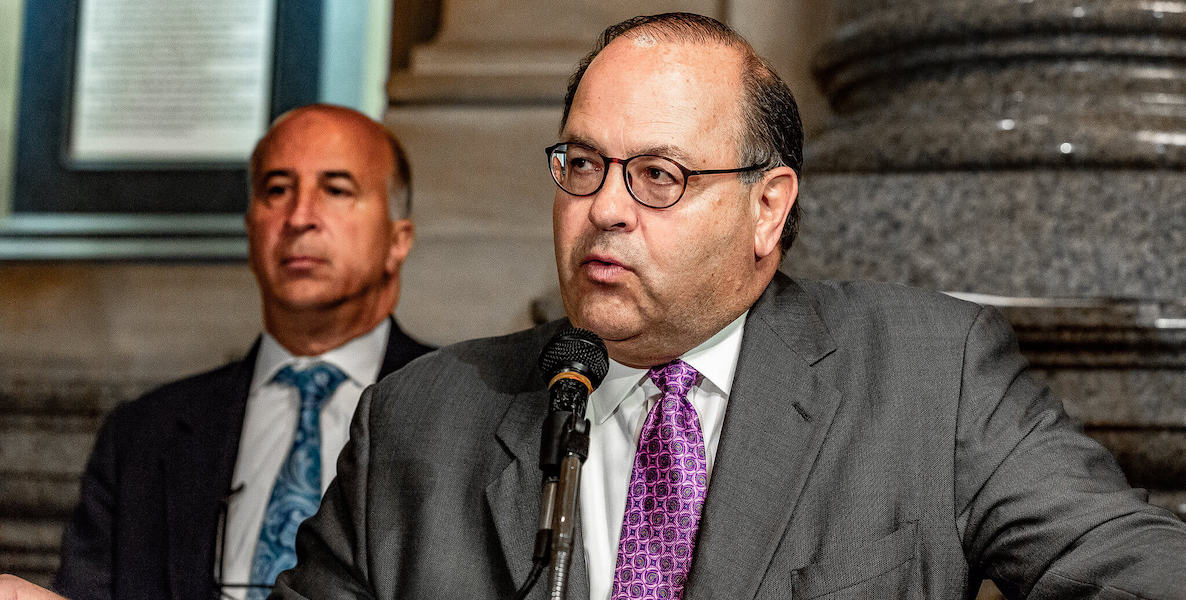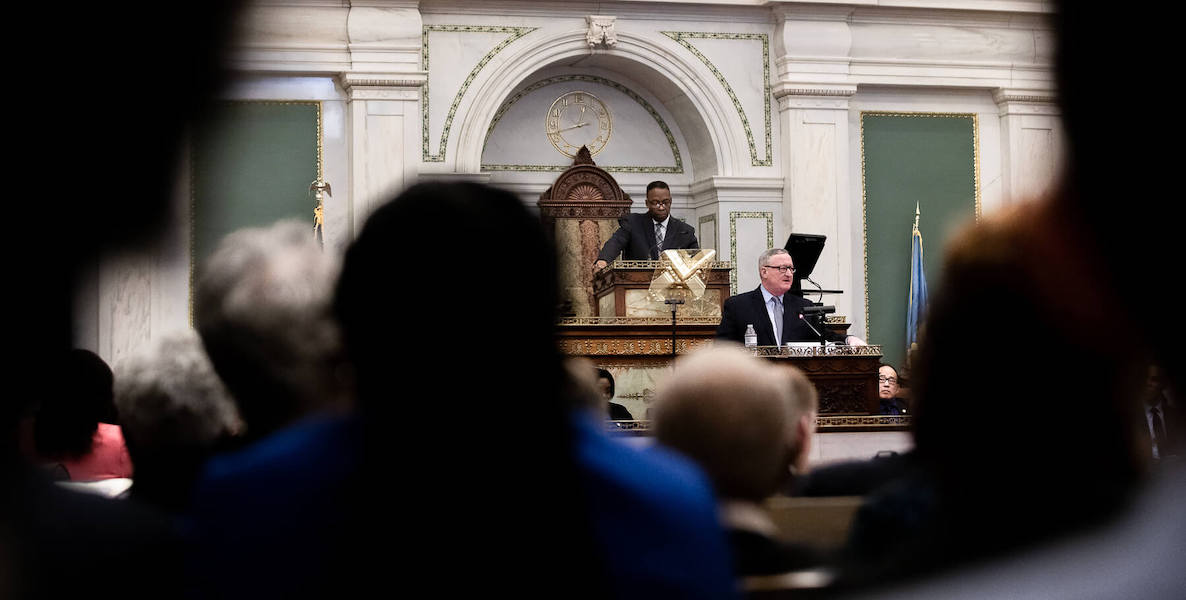What is pay-to-play in a nutshell? It’s when a politician awards government contracts to those donating to political campaigns.
In most of America, we’ve collectively drawn a line in the sand when it comes to the notion of pay-to-play. In Philly, though, it’s not quite as simple as that. Philadelphia is an old city. Our ethics laws about greased palms and political campaigns stretch all the way back to … 2005.
That year was an interesting one for Philly ethics. That February, federal prosecutors brought to trial former city treasurer Corey Kemp on 46 (46!) counts of corruption. His charges ranged from mail fraud to extortion to fake tax returns. The following May, he was convicted of 27 of those counts, and sentenced to 10 years in prison.
Kemp was hit the hardest—and to many eyes, was really a low-level fall guy—but 11 others were also swept up in the investigation. Four of them (two bank executives, one fast-food restaurateur from Detroit, and a printer/mistress) were found guilty of various offenses, including lying to grand juries and the FBI.
How political pay-to-play works in real time
The man upon whom this grimy conspiracy circled like a gas station toilet bowl was Ronald A. White—bond lawyer, Democratic fund-raiser, and personal friend of Mayor John Street. Mayor Street wasn’t ultimately implicated in any wrongdoing. But the episode laid out how political pay-to-play works in real time:
- White gives money to and/or fundraises for Mayor Street.
- Mayor Street wins reelection.
- Mayor Street instructs his staff (according to federal prosecutors) to give White and his clients city contracts “whenever they appeared to be qualified,” and otherwise provide insider information.
- White gets Corey Kemp on the phone when he wants to hear people say things like, “You got your boy in the treasurer’s seat,” or “We take care of each other” (all actual things Kemp said).
- When other financial firms send in proposals for city contracts, White gets on the phone and asks them to give money to the mayor. If they refuse, Treasurer Kemp throws their proposals in the trash.
- White gets himself wiretapped by the FBI in 22,850 individual conversations.
Federal prosecutors didn’t actually need to go after White at all. He died of cancer before the case could be brought to trial. Corey Kemp and his 27 felonies would have to suffice, then.
Do we have laws to prevent pay-to-play in Philly politics?
Between 2005 and 2010, numerous laws went onto the books attempting to expunge these types of pay-to-play tactics from Philly’s politische Machine:
- Chapter 17-1400 of the Philadelphia Code imposed campaign disclosures and donation limits. (Give more than $2,600 to a candidate during a year and you can’t be gifted a contract over $10,000.)
- Regulation No. 8 limited “partisan political activity on the part of city officers and employees.” (Are you a city employee who likes get-out-the-vote parties? You’re not anymore.)
- Regulation No. 9 created a lobbyist registration to track anyone who tries to “influence legislative or administrative action.” (There’s a historical registration of persons no one seemed to care about. Jews and Muslims? Yes. Lobbyists? Nope. Lobbyists just get no love. Money—they get lots of money, but no love.)
Even with these laws in place, pay-to-play can still elbow its way into our politics. To wit, I give you union boss John Dougherty and his City Council cohort Bobby Henon, both of whom were convicted of bribery and other odious offenses last fall after the feds recorded a series of Sopranos-like phone calls between the men.
Now –former Councilmember Henon, in particular, was convicted of taking bribes from Dougherty, the Philadelphia Parking Authority board chair Joseph Ashdale and James Gardler, president of Communication Workers of America Local 13000.
And so, pay-to-play lives another day in Philadelphia politics
What the laws don’t address is the more insidious nature of Philly politics, that time-old tradition of trading favors for support, in a way that skirts the pay-to-play laws. Soon-to-be-Mayor John Street summed it up this way in 1999: “The people who support me in the general election have a greater chance of getting business from my administration than the people who support Sam Katz.”
You need only look no further than councilmanic prerogative, on display in early 2022 as Councilmember Kenyatta Johnson and his wife, Dawn Chauvin, go on trial.
Sizable monetary donations, which are prevented by Chapter 17-1400, can be substituted by all manner of political favoritism. Work with or donate to a councilmember’s civic group and he’ll green-light development projects within his district. Provide benefits to the community in a specific way, or show a willingness to hire certain contractors or union leaders, and you’ll find your bids getting through a whole lot easier.
Shun these… philanthropic niceties, let’s say… and you may find an obstinate councilperson blocking your intended expansion of a cancer center. That’s councilmanic prerogative. And it’s entirely legal in Philadelphia—and, until Mayor Lori Lightfoot effectively banned it, a few other bastions of political wholesomeness, like…Chicago.
There is no sure-fire way to purge corruption from our politics. As encouraging and well-intentioned as measures such as 17-1400 are, the swamp has a way of seeping through any cracks in the system. Greater transparency and cutting the flow of unfettered cash donations is an effective place to start, though.
As Mayor Street elegantly commented about the city’s corruption tendencies, “Anybody who doesn’t acknowledge that’s the way it works is either a liar or thinks you’re really stupid.”
Let’s do what we can to hold to account the liars and the people who think we’re stupid.
![]()
RELATED
Header photo by Viacheslav Bublyk / Unsplash









